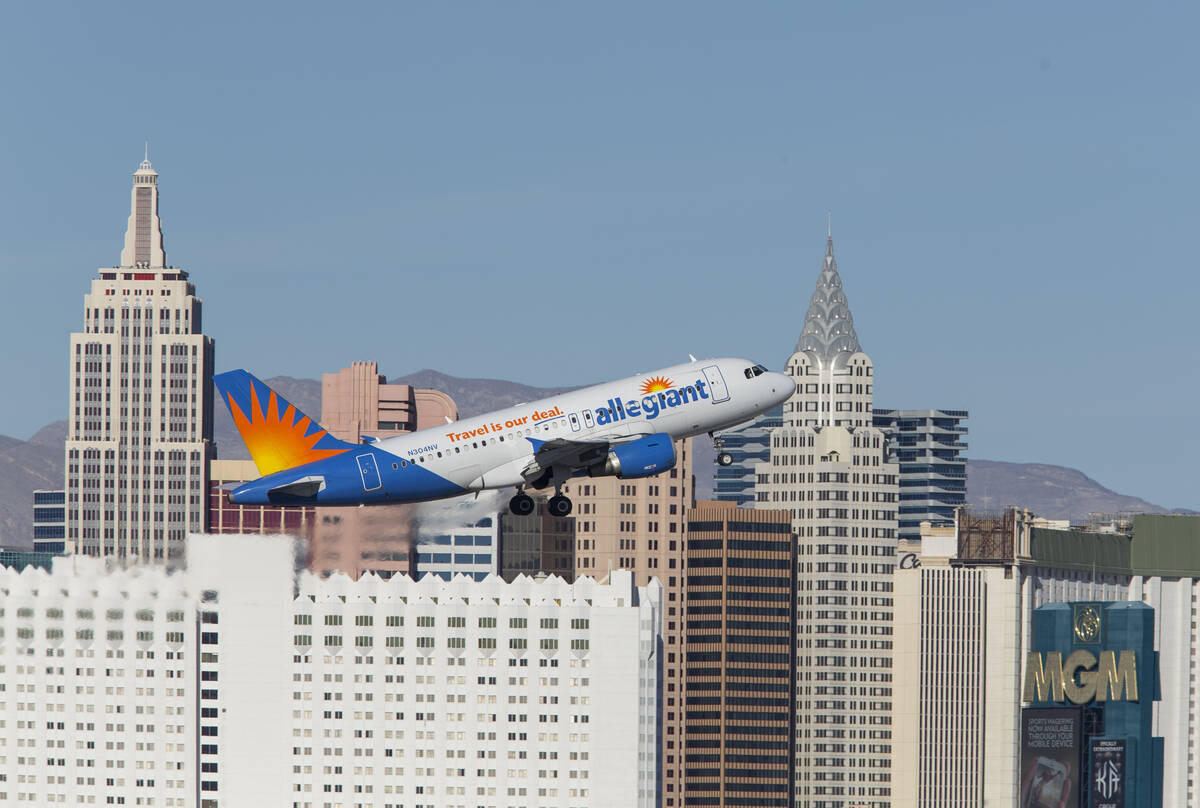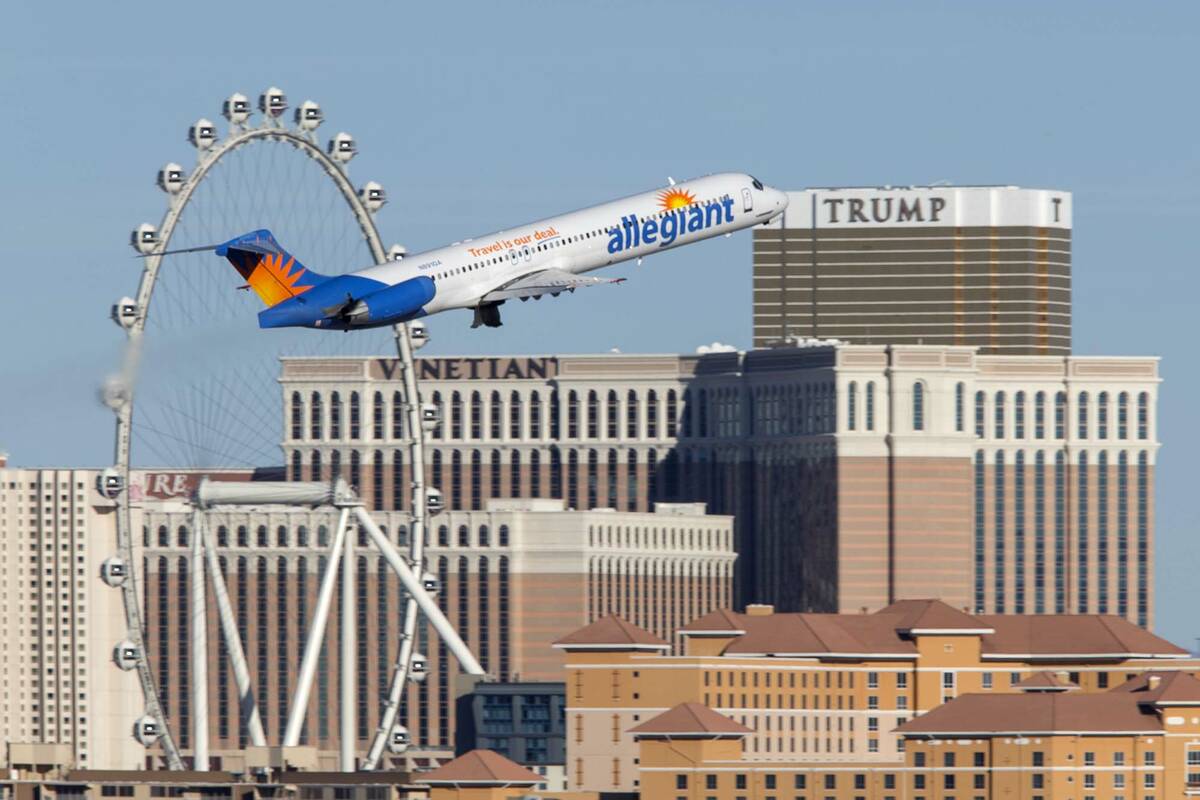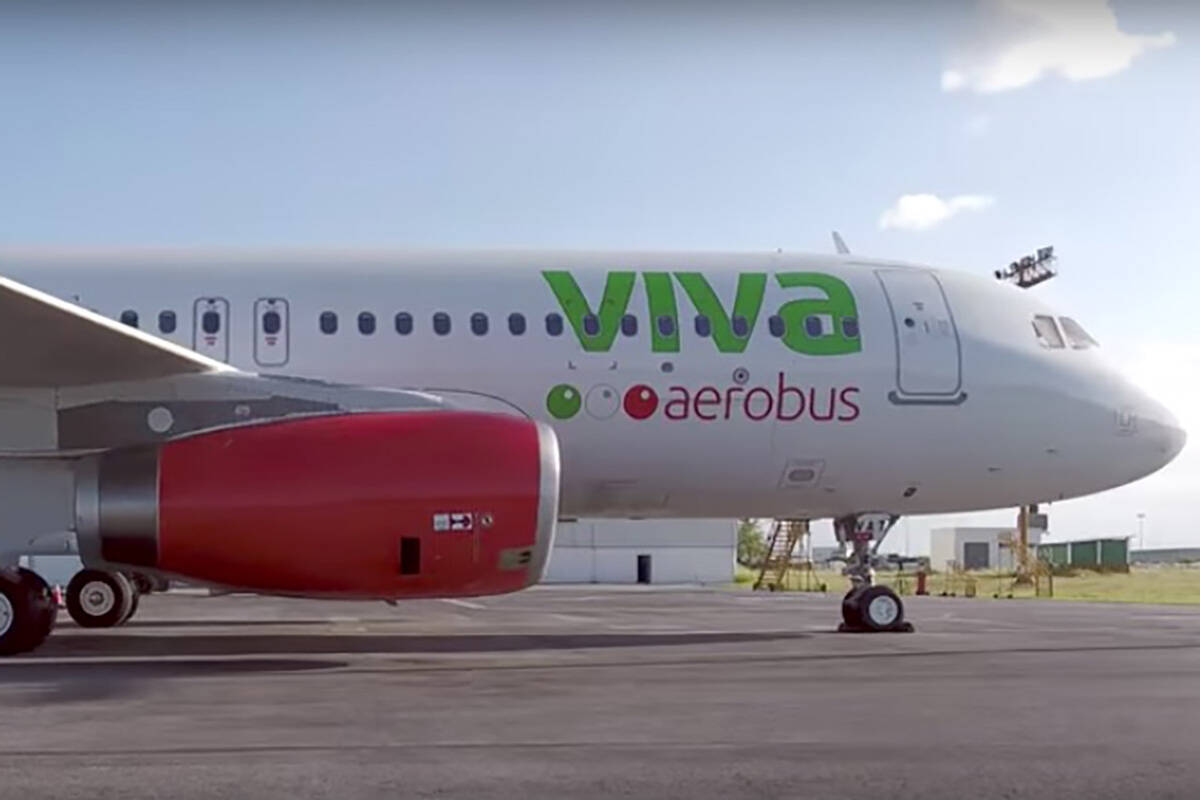Allegiant pilots oppose plan to partner with Mexican air carrier
Las Vegas-based Allegiant Air has developed a plan to offer nonstop flights to Mexico from some of its U.S. cities, including Las Vegas, through a partnership with Mexico-based ultra-low-cost carrier Viva Aerobus.
But Allegiant can’t develop any details of its plan until it receives antitrust immunity from the U.S. Department of Transportation, which reviews partnerships to prevent anti-competitive deals from occurring.
With a decision from the Department of Transportation weeks away, the airline’s pilot’s union, the Allegiant Pilots Association Teamsters Local 2118, has come out against the department granting immunity because they fear Viva Aerobus pilots would do most of the flying.
While Viva Aerobus would likely handle most of the flying for the first three years of the agreement, Allegiant has assured pilots that it would eventually gear up to do more than half of the service.
“This is a first-of-its-kind metal-neutral joint venture,” Allegiant Director of Alliances Drew Teitelbaum said in an interview last week. “There hasn’t been two ULCCs (ultra-low-cost carriers) forming a relationship that we’re attempting to form now.”
Stumbling blocks
There are numerous stumbling blocks on the pathway to Allegiant someday providing flights to Mexico’s beach resort cities.
Teitelbaum admits it would “take us a little while to catch up to Viva, considering they already have a head start.”
Viva Aerobus currently offers flights from Mexico to Harry Reid International Airport. But the airline, which flew more than 170,000 passengers to Las Vegas in 2022, could benefit greatly from a relationship with Allegiant because Allegiant could also sell Viva customers hotel rooms and entertainment packages in one transaction.
Both Viva and Allegiant have tried independently to provide service between the two countries, but both have fallen short of expectations. The bid to work together is the latest effort toward inaugurating service.
The pilot’s union, which is in the midst of contract negotiations with Allegiant, doesn’t trust the airline’s pitch that pilots would get as much or more flying time than their Viva counterparts. They believe Allegiant eventually would offshore most of the flying to the Mexican pilots since they are paid considerably less than Allegiant pilots — who they say are also underpaid by U.S. standards.
“Allegiant already benefits from significantly lower labor costs than any other comparable industry peer and has every intention of keeping it that way,” said Capt. Andrew Robles, president of the pilot’s union. “This proposed joint venture is a further attempt by Allegiant management to circumvent rising labor standards and market pressures for increased wages for airline pilots in America.”
In a letter to Transportation Secretary Pete Buttigieg, Robles said the union opposes antitrust immunity, which was similarly granted in 2017 to Delta Air Lines as it developed a relationship with Aeromexico.
“There is nothing in Allegiant’s request for antitrust immunity that indicates that Allegiant pilots will receive equitable work in comparison to the proposed foreign pilots,” Robles said in his letter. “We are convinced that the intention is to replace American airline pilot jobs with those of Mexican pilots whose salaries are approximately five to six times lower than our members’ negotiated salaries, which are already far below the industry standard. No doubt, this would give Allegiant an unfair competitive advantage over all other U.S. carriers.”
Initially excited
In an interview with the Review-Journal, Robles said when he first heard the request, he was excited about the prospects.
“We were very excited about it initially, and during the contract negotiations, we were hoping that we would be able to have equal flying in that agreement and, in that case, we’d be onboard with it,” he said. “After several discussions over the last two years, it’s clear that the company doesn’t want us to get any of that flying and is not willing to put that in writing that we would get any.”
Teitelbaum and Keith Hansen, senior vice president of government affairs for Allegiant, said its business model of flying from small-town American cities to resort cities like Las Vegas, Orlando and Punta Gorda, Florida, and Myrtle Beach, South Carolina, would fit right in with efforts to fly to Mexican resort cities like Cancun.
But Allegiant needs a relationship with Viva Aerobus because it controls much of the flying slots into Cancun International Airport.
Hansen explained that Mexican resort cities are popular with Americans during spring break and summer vacations. Mexican travelers, meanwhile, more frequently fly off those peak times, so there would be plenty of opportunities for both carriers to operate when they’d have a larger market to serve.
Hansen also noted that Allegiant’s business model is geared toward stimulating additional flying.
“My favorite example is Minot, North Dakota,” he said. “Nobody flew to Las Vegas from Minot, but when we put a nonstop flight there, we filled planes with people who had wanted to go to Las Vegas, but never did because it was too expensive to go on the legacy carriers that operated with stops in Minneapolis.”
A public comment period on Allegiant’s antitrust immunity ended last week, but the Department of Transportation solicits additional testimony to answer questions raised in public comments.
A decision on the immunity proposal is expected within a few weeks.
Contact Richard N. Velotta at rvelotta@reviewjournal.com or 702-477-3893. Follow @RickVelotta on Twitter.

























